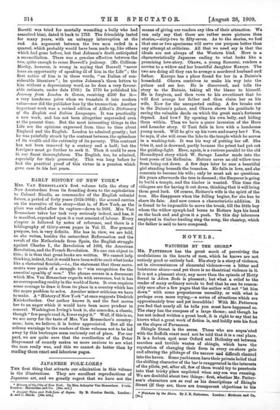EARLY HISTORY OF NEW YORK.*
MRS. VAN RENSSELAER'S first volume tells the story of New Amsterdam from its founding down to the capitulation to Colonel Nicolls, as commander of the English colonial forces, a period of forty years (1624-1664) ; the second carries on the narrative of the story—that is, of New York, as the place was called after its capture—down to 1691. Mrs. Van Rensselaer takes her task very seriously indeed, and has, it is manifest, expended upon it a vast amount of labour. Every elm pter is followed by notes of reference, and there is a bibliography of thirty-seven pages in -Vol. II. Her general purpose, too, is very definite. She has in. view, we are told, as she writes, besides the antecedent Reformation and the revolt of the Netherlands from Spain, the English struggle against Charles I., the Revolution of 1688, the American Revolution, and the French Revolution. No one can object to this ; it is thus that great books are written. We cannot help thinking, indeed, that it would have been well to omit what looks like a rhetorical flourish,—i.e., the statement that these move- ments were parts of a struggle to "win recognition for the essential equality of In-en." The phrase occurs in a document which Mrs. Van Rensselaer regards with reverence, but it, has no corresponding reality in the world of facts. It even requires some courage to draw it from its place in a country which has the negro problem to solve. Another minor criticism we have to make. A "History of New York "at once suggests Diedrich Knickerbocker. Our author knows it, and the fact moves her to an anger which it would have been more prudent to conceal. Washington Irving's book is, she concedes, a classic, though "few people read it, fewer enjoy it." Well, if this is so, we are sorry for the taste of Mrs. Van Rensselaer's country- men ; here, we believe, it is better appreciated. But all the solemn warnings to the readers of these volumes not to be led away by this burlesque seem curiously out of place. For our part, we are quite sure that the recollection of the Peter Stuyvesant of comedy makes us more anxious to see what the man really was, and this we cannot do better than by reading these exact and laborious pages.






































 Previous page
Previous page